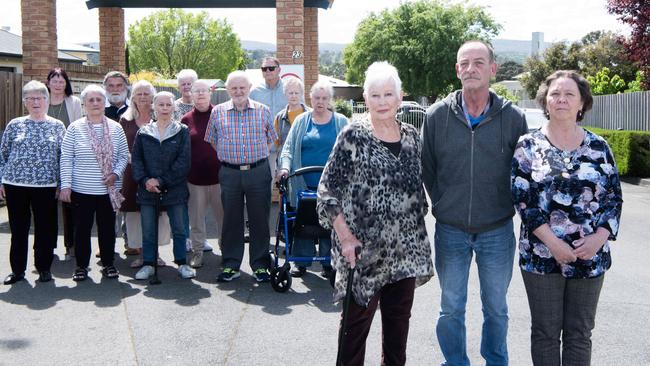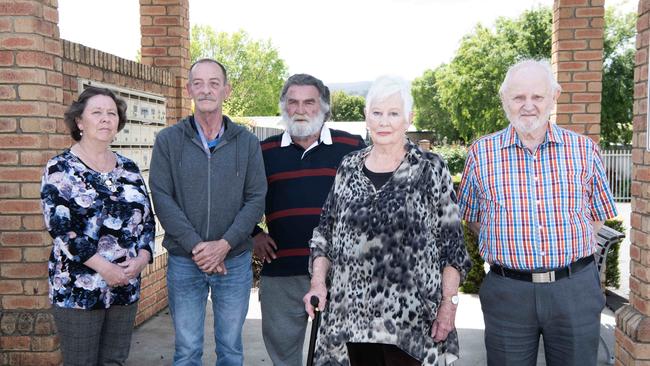Double-digit rent increases expose pensioners’ lament
A rental commissioner has ruled against the rental increases for pensioners as the consumer watchdog eyes an unconscionable conduct case.

This is the blue rinse rebellion that Eureka never foresaw.
As with many older Australians of modest means, Leanne Crawford was lured by the promise of affordable living when she moved into Eureka Group’s Launceston community three years ago.
That illusion was shattered for the 61-year mother and welfare recipient when she and dozens of her fellow residents were issued with rental increase notices of a magnitude that could have forced many of them out of their homes.
Late last year, Eureka began demanding increases of up to $50 a week – in Leanne’s case from $335 to $385 a week – or 14 per cent. This was double the rate of overall rental inflation at the time and well beyond average market rates.
Then in July this year, Ms Crawford was informed by Eureka that it would be going up again by $55 a week. In the space of 12 months, the unemployed mother was being asked to bear close to a 30 per cent increase in rent, which would eventually consume more than 70 per cent of her weekly income.
Her case was among 48 that has inspired a modern-day eponymous rebellion against the Eureka Group that spruiks its homes as affordable and community-focused.
Pensioners and the disabled are now mounting an uprising against what they claim is corporate greed in the retirement villages of northern Tasmania, where inflation has struck hard and the housing shortage crisis is most acute. One by one, residents have been taking their cases to the state government’s rental commissioner. In every case, the commissioner has ruled against Eureka’s increases on the basis that they were unreasonable.
The ASX-listed company habitually ignored obvious warnings from the commissioner.
The tenants’ union acting for the residents had had enough and two weeks ago it filed a complaint with the ACCC for unconscionable conduct, on the basis that the company continued to promote affordable living for seniors despite the tribunal’s consistent rejection of its excessive rental increases.

“I moved into Eureka three years ago after my husband passed away. I was attracted by the security, the sense of community and the affordability,” Ms Crawford said. “It is increasingly difficult to make ends meet. I’m in sole receipt of Jobseeker, which means skyrocketing rents have meant I struggle to pay for incidental costs like the electricity, telephone and my medications.
“Although I had a win in challenging Eureka’s $55 per week rent increase, I am worried for all the other residents who told me they were too scared to challenge the rent increase for fear of being evicted. We badly need law reform so that only fair rent increases can be asked for.”
David Richardson, a 63 year old who moved into the village seven years ago, said: “Its shocking the way they treat people here.”
Mr Richardson is among the unlucky. Of the almost 50 residents of the Eureka Group’s older living villages who have successfully challenged excessive and unfair rent increases over the past year, he claims to have never received a letter. He has no ability to challenge the increase and fears he may now have to look elsewhere for accommodation.
“There is hardly any maintenance done,” he said. “As well, when I moved in, we had a full-time manager. Now we only have a part-time manager. We are paying more for less.”
Linda Lovegrove, another resident of the Launceston village who survives on disability supplements, said she feared another rental increase would force her out of her home. “I thought the $50 rent increase was absolutely unreasonable because it does not reflect the level of service provided,” she said.
“I am frightened that in a few months I am going to get another rent increase that I won’t be able to afford. There is a lack of affordable rentals and I’m worried about where I will go, if I cannot afford the rent. I believe that Eureka are targeting older people because they are more vulnerable.”
Then there is Steven Boyer who has lived in Eureka for just over two years and is 71. He is on the younger side of the average age of Eureka residents. which the union says is 75. Last year, Mr Boyer’s rent increased by $50 a week (from $390 to $440). This year he was told his rent would be increasing by $30 a week (from $440 to $470).
After submitting an unreasonable rent increase application with the assistance of the Tenants Union of Tasmania, he was told his rent could increase by only $15 a week – a 50 per cent reduction on what Eureka wanted him to pay. “I’m disgusted that Eureka increased my rent by $50 per week last year and wanted to increase by $30 per week this year,” he said.
“My unit is the size of a dog-box and although I was told there would be lots of activities provided by Eureka when I moved in, that has not happened.”
The Eureka rebellion is at the pointy end of the housing and cost-of-living crisis. While the company claims tenants can leave at any time with no penalty, the problem is there is virtually no other place to go.
The greatest surge in homelessness in Tasmania is among older Australians. An Anglicare Australia report showed there were no affordable rental properties for welfare recipients in northern Tasmania. Demand outstrips supply at crippling levels, with the demand for social housing in Tasmanian outstripping the waitlist by 87 per cent in the past decade.
The Institute for Health and Welfare recently reported the group experiencing the biggest increases in rates of homelessness in Tasmania was older Australians.





To join the conversation, please log in. Don't have an account? Register
Join the conversation, you are commenting as Logout